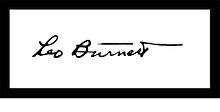Leo Burnett Worldwide
 | |
| Industry | Advertising |
|---|---|
| Founded | August 5, 1935 |
| Founder | Leo Burnett |
| Headquarters |
Leo Burnett Building Chicago, Illinois, U.S. |
Number of locations | 85 offices worldwide |
Number of employees | 9,000+ |
| Parent | Publicis Groupe |
| Divisions |
Arc Worldwide Rokkan Turner Duckworth |
| Website | www.leoburnett.com |
Leo Burnett Worldwide, Inc., also known as Leo Burnett Company, Inc., is an American advertising company, founded on August 5, 1935 in Chicago by Leo Burnett.[1]
In September 2002, the company was acquired by Publicis Groupe, the world's oldest and third largest advertising agency holding group and one of the largest agency networks.[2][3]
History
Leo Burnett Company, Inc. was founded on August 5, 1935 in Chicago by Leo Burnett, who had three accounts to start.[4][2] In 1944, the agency opened a branch office in New York City. In February 1967, the founder transferred all of his voting stock to a charitable organization. On March 20, 1967, the agency completed its acquisition of D.P. Brother & Co.[2] On June 8, 1971, the founder died at the age of 79.[5]
On November 3, 1999, Burnett and D'Arcy Masius Benton & Bowles, announced the creation of BDM. BDM was quickly renamed Bcom3. Roy Bostock was named Chairman and Roger Haupt was named CEO.
In September 2002, Bcom3 was acquired by Publicis Groupe.[6][2]
Rich Stoddart became CEO in 2016.[7]
Clients
Appliances
In 1961, the agency created the "Dependability" campaign for the Maytag brand. The campaign featured actual consumer testimonials on the reliability of their appliances. The campaign evolved into a radio call-in show in Canada where an appliance repairman would offer advice to customers. In 1967, the 'Ol Lonely character debuted on television. Jesse White played the role of the lonely Maytag repairman until 1989 when he was replaced by actor Gordon Jump.[8]
Baked goods
The Pillsbury Doughboy was created for the Pillsbury Company by Rudy Perz, a copywriter for Leo Burnett.[9]
Canned tuna
Agency employee, Tom Rogers, created the character Charlie the Tuna for StarKist Tuna. The ad campaign added the phrase "Sorry Charlie" to the American lexicon. StarKist still uses the spokesfish to represent the brand.[10]
Canned vegetables
The Jolly Green Giant and Sprout advertising icons came out of the agency. The Minnesota Valley Canning Company originally created the Jolly Green giant character as a large, cave-man looking character to draw attention of the size of their LeSeur peas. The Leo Burnett agency was hired to make the Jolly Green Giant more friendly looking. In 1972, the Jolly Green Giant was joined by Sprout to appeal to children.[11][12]
Cigarettes
The agency guided Philip Morris (now part of Altria Group) in building Marlboro into a global brand, with an emphasis on manliness as typified by the image of the Marlboro Man on the American Frontier.[13][14][15]
Hamburgers
Hamburger giant McDonald's began operations in India in 1996 and recruited Leo Burnett (India).[16]
See also
References
- ↑ "Company Overview of Leo Burnett Company, Inc". Bloomberg. Retrieved 10 April 2018.
- 1 2 3 4 "Leo Burnett Co". Retrieved 2018-05-31.
- ↑ "Leo Burnett Worldwide, Inc.: Private Company Information - Businessweek". Businessweek.com.
- ↑ "Company Overview of Leo Burnett Company, Inc". Bloomberg. Retrieved 10 April 2018.
- ↑ "Leo Burnett, 79, Led Ad Agency". The New York Times. 1971-06-09. ISSN 0362-4331. Retrieved 2018-05-31.
- ↑ "Leo Burnett Worldwide, Inc.: Private Company Information - Businessweek". Businessweek.com.
- ↑ "Leo Burnett Worldwide names new CEO". Crain's Chicago Business. January 27, 2016. Retrieved 2017-11-15.
- ↑ "Still Lonely After All These Years (8/1)". Retrieved 2018-05-18.
- ↑ Sam Roberts (2010-04-03). "Rudolph Perz, Creator of Pillsbury's Doughboy, Dies at 89". The New York Times. Retrieved 2018-10-02.
- ↑ Holley, Joe (2005-07-08). "Charlie the Tuna Creator Tom Rogers Dies". ISSN 0190-8286. Retrieved 2018-04-06.
- ↑ "Character of the Week: Jolly Green Giant". Retro Planet. 2009-02-28. Retrieved 2018-04-30.
- ↑ Taylor, Heather (2017-08-28). "The Story of Green Giant's Sprout". AW360. Retrieved 2018-04-30.
- ↑ Navid Hafez, and P. M. Ling. "How Philip Morris built Marlboro into a global brand for young adults: implications for international tobacco control." Tobacco control 14.4 (2005): 262-271.
- ↑ John G. Blair, "Cowboys, Europe and smoke: Marlboro in the saddle." in Rob Kroes and Michael P. Malone, eds., The American West: As seen by Europeans and Americans (1989): 360-83.
- ↑ Hilary Cooperman and Relli Shechter. "Branding the Riders: 'Marlboro Country' and the Formation of a New Middle Class in Egypt, Saudi Arabia, and Turkey." New global studies 2#3 (2008).
- ↑ William M. O'Barr, "Advertising in India." Advertising & Society Review 9#3 (2008): 1-33.